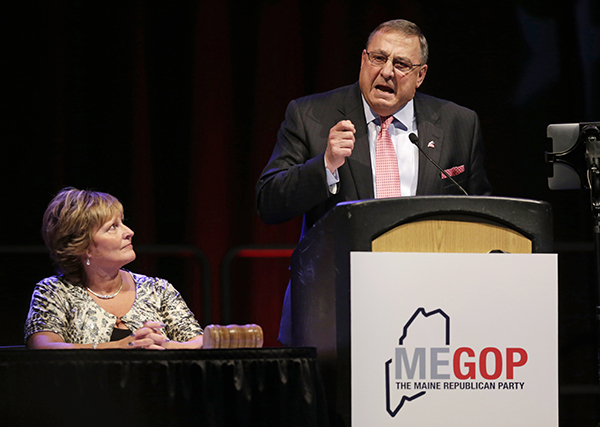The LePage administration continued to press for new restrictions on state aid to undocumented immigrants Friday only to be rebuffed by Maine Attorney General Janet Mills for the second time in one week.
Regrouping after an earlier Mills rejection, the Maine Department of Health and Human Services proposed prohibiting municipalities from tapping into state funds to provide General Assistance to “illegal immigrants.”
The proposal was less sweeping than the earlier rule change rejected by Mills that could have denied General Assistance to hundreds of legal asylum seekers and other immigrants. But the result was largely the same.
“It does not assuage our concerns raised in the memo,” said Tim Feeley, spokesman for Mills, referring to an earlier memo raising constitutional and statutory issues about the original proposal.
Undeterred, the administration signaled it would not back down as Gov. Paul LePage continues his push to reform a state welfare system he views as bloated and overly generous.
“The department is confident it is on solid legal footing regarding the exclusion of illegal aliens from this welfare program, and intends to move forward with enforcement,” DHHS Commissioner Mary Mayhew said in a statement.
Friday’s back-and-forth between the Republican LePage administration and the Democrat serving as the state’s top attorney highlighted the political undertones of the debates over both immigration and welfare reform. It could also serve as political fodder for both parties as LePage seeks re-election to the Blaine House in a tight, three-way race.
Since December, LePage has sought to prohibit state aid from flowing to undocumented immigrants as well as those who are seeking asylum in the United States because of persecution in their home countries. The administration maintained the revision would bring General Assistance standards in line with qualifications for federal aid such as Temporary Assistance for Needy Families and food stamps.
The proposal would not ban communities from offering General Assistance to asylum seekers, but would force municipalities to foot the bill on their own. But immigration advocates and Portland city officials argued the changes would force asylum seekers onto the streets or into shelters while they await the lengthy approval process for a federal work permit.
In 2013, the state of Maine contributed $18 million to municipal General Assistance programs that offer emergency money to individuals or families struggling to meet basic needs, such as housing, food and heating.
The state reimburses most municipalities for up to 50 percent of General Assistance costs but pays up to 90 percent in Portland, Lewiston and Bangor. As a result, the LePage administration’s plan to withhold state funds for asylum seekers would have a disproportionate impact on Portland and Lewiston, both of which have seen an influx of asylum seekers from African countries in recent years.
Last week, Mills determined that the administration’s proposal to deny General Assistance aid to some immigrants violated the equal protection clauses of both the state and federal constitutions. Mills also questioned the state’s authority to dictate the terms of a locally administered program and suggested the rule change would pose an excessive unfunded mandate on local governments that would have to determine immigration status for the first time.
Mayhew issued a statement Friday saying the administration was “extremely disappointed” with Mills’ rejection of what the administration saw as a “common-sense measure.” Mayhew also outlined generally the administration’s plans to prohibit state funds from flowing to “illegal immigrants” while still allowing them for documented noncitizens.
“We hope that by narrowing the rule to prohibit state funds from being used by illegal immigrants, we will get agreement from Attorney General Mills to move forward,” Mayhew said. “The LePage administration remains committed to protecting our scarce resource for the people of Maine and this country, particularly the elderly and disabled.”
But Mills’ May 16 memo regarding the administration’s original proposal suggests that the revision may face similar constitutional hurdles.
“The state must treat noncitizens and citizens alike with an even hand,” Mills wrote. “Because (the proposed rule) would subject noncitizens to differential treatment with respect to eligibility for General Assistance, it is unconstitutional.”
Neither a DHHS representative nor LePage spokeswoman Adrienne Bennett replied to subsequent requests for clarification on the administration’s definition of “illegal immigrants” or documented noncitizens.
Those terms have become part of the immigration debate. Immigrant advocacy groups reject the term “illegal immigrant” and often prefer the term “undocumented.” But even that descriptor is problematic in a complicated federal immigration process in which someone can enter the country illegally, or without paperwork, but later receive temporary protection from deportation by requesting asylum.
Portland has become a destination for both asylum seekers and refugees, who have already been admitted to the United States through the federal government’s refugee resettlement program. While refugees receive considerable assistance from the federal government and the resettlement assistance organization Catholic Charities Maine, those seeking asylum from political persecution are unable to work and are ineligible for other federal aid such as food stamps.
Currently, many asylum seekers in the Portland area are waiting up to two years to even receive the required interview with immigration officials as part of their application, according to the Immigration Legal Advocacy Project. Many then wait months or even a year for a decision on their application.
Last November, the city of Portland provided General Assistance for housing to 351 households representing 592 individuals whose visa requests or asylum applications were still pending. All told, Portland spent $9.7 million on General Assistance in fiscal year 2013, 31 percent of which went to refugees, visa holders, asylees and asylum applicants.
Doug Gardner, who heads the city’s Health and Human Services Department, said that while the sum spent on asylum seekers is a “significant number,” the city’s expenditures would be even higher if those people ended up in city shelters. He said it was not possible to separate out expenditures on individuals who would be considered “illegal” under the LePage administration’s proposal.
Meanwhile, organizations that work with immigrants cheered Mills’ refusal to sign off on the LePage administration’s original proposal.
“Maine will not discriminate against our neighbors simply because they were not born here,” said Robyn Merrill of Maine Equal Justice Partners, who was among several dozen people who gathered Friday at Portland City Hall for a news conference. “That is not the Maine we know and love.”
Portland Mayor Michael Brennan accused LePage of trying to “circumnavigate the legislative process.”
“So we are very pleased and very glad that (Mills) stood up and said this is an unfunded mandate and it is unconstitutional,” Brennan said.
Alain Nahimana with the Maine Immigrant Rights Coalition said the process was an example of “democracy at its best” as immigrants and other Mainers quickly mobilized to push back against the proposal.
“Today we are pleased to say that justice was on our side,” Nahimana said.
Kevin Miller can be contacted at 791-6312 or at:
Twitter: KevinMillerPPH
Send questions/comments to the editors.





Comments are no longer available on this story